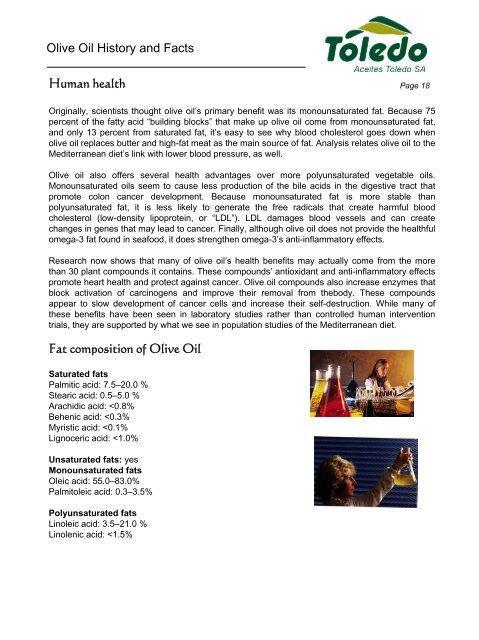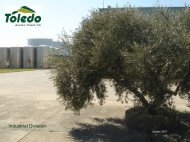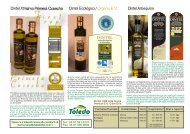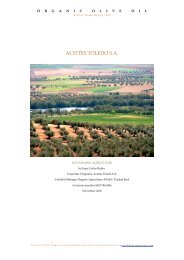On Olive Oil History and Facts. - Aceites Toledo SA
On Olive Oil History and Facts. - Aceites Toledo SA
On Olive Oil History and Facts. - Aceites Toledo SA
Create successful ePaper yourself
Turn your PDF publications into a flip-book with our unique Google optimized e-Paper software.
<strong>Olive</strong> <strong>Oil</strong> <strong>History</strong> <strong>and</strong> <strong>Facts</strong><br />
Human health<br />
Page 18<br />
Originally, scientists thought olive oil’s primary benefit was its monounsaturated fat. Because 75<br />
percent of the fatty acid “building blocks” that make up olive oil come from monounsaturated fat,<br />
<strong>and</strong> only 13 percent from saturated fat, it’s easy to see why blood cholesterol goes down when<br />
olive oil replaces butter <strong>and</strong> high-fat meat as the main source of fat. Analysis relates olive oil to the<br />
Mediterranean diet’s link with lower blood pressure, as well.<br />
<strong>Olive</strong> oil also offers several health advantages over more polyunsaturated vegetable oils.<br />
Monounsaturated oils seem to cause less production of the bile acids in the digestive tract that<br />
promote colon cancer development. Because monounsaturated fat is more stable than<br />
polyunsaturated fat, it is less likely to generate the free radicals that create harmful blood<br />
cholesterol (low-density lipoprotein, or “LDL”). LDL damages blood vessels <strong>and</strong> can create<br />
changes in genes that may lead to cancer. Finally, although olive oil does not provide the healthful<br />
omega-3 fat found in seafood, it does strengthen omega-3’s anti-inflammatory effects.<br />
Research now shows that many of olive oil’s health benefits may actually come from the more<br />
than 30 plant compounds it contains. These compounds’ antioxidant <strong>and</strong> anti-inflammatory effects<br />
promote heart health <strong>and</strong> protect against cancer. <strong>Olive</strong> oil compounds also increase enzymes that<br />
block activation of carcinogens <strong>and</strong> improve their removal from thebody. These compounds<br />
appear to slow development of cancer cells <strong>and</strong> increase their self-destruction. While many of<br />
these benefits have been seen in laboratory studies rather than controlled human intervention<br />
trials, they are supported by what we see in population studies of the Mediterranean diet.<br />
Fat composition of <strong>Olive</strong> <strong>Oil</strong><br />
Saturated fats<br />
Palmitic acid: 7.5–20.0 %<br />
Stearic acid: 0.5–5.0 %<br />
Arachidic acid:









